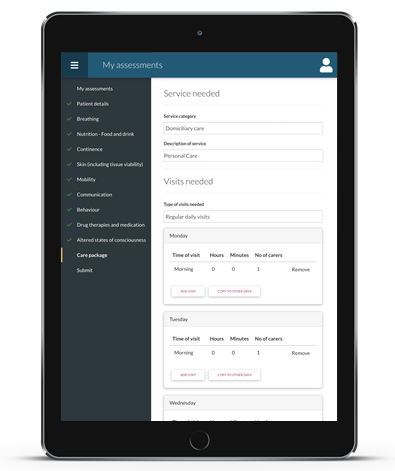What, if given a specific set of circumstances you could predict the future or look back into the past? What if you could foresee the things people need to foresee?
If you've seen the current BBC show DEVS you'll know that this may well be possible in the fictional world that it's set in. For those of you that haven't seen it, I encourage you to do so; it's awesome. The role of product management is, in many ways, comparable to the goal of DEVS. To consider a set of circumstances and, from those:
-
identify issues, challenges and desired outcomes
-
identify the optimum ways in which to solve the issues, overcome the challenges and deliver the desired outcomes
-
design and build a solution or service that does b)
So, in many ways to predict future needs, you need to know what the current circumstances are and how they’ll affect future service delivery. The question you might be thinking is how does this relate to Digital Engines and the public sector? Let’s consider a set of circumstances:
A council adhering to the rules of lockdown where:
-
Face-to-face contact is removed
-
physical contact including passing paper documents around isn’t possible
-
citizens and businesses are under considerable financial stress
-
citizens facing isolation may need support and guidance where it was not previously required
These four areas led us to consider the vastness of services that councils provide.
The sheer complexity of local government services means that trying to predict an optimum way to solve every challenge becomes exponentially difficult. But difficult is not impossible. Deep thought and opinion led us to conclude that lots of loosely coupled 'engines’ would prove most effective.
By engines, we mean a similar thing to the recipes, pipes, crochet of old but with nuance. An engine is capable of doing something and is able to link to another engine connected by common ‘pipes'.
Whilst 'fixing the plumbing' highlighted a need for richer integration, and platforms taught us to have common approaches to the same things, engines push this further by aggregating it all into a entangled web of commoditisation. We subsequently found that Paul Davidson, CIO of Sedgemoor District Council talks in a similar vein here.
To help illustrate this, we created a visualisation of outcomes people need from a council on the left. The core engines that will provide it and the pipes that connect these together with legacy functions/apps are to the right of this:

To delve further, if we select one of these engines: ‘Query Resolution’, we can see that it is interconnected with many other engines leveraging common pipes:
Engines and the circumstances of lockdown
Let’s walk through some specific circumstances (use cases) and how engines can enable solutions to the challenges.
Example One - New Support Services required
Lockdown provided a vicious trio of circumstances for councils.
- Firstly, they needed to mobilise resources that were forced to work from home at a rapid rate
- Secondly, they needed to provide a myriad of new services such as: Business Rates Grants, Financial Support services, Emergency Parking services, and Leisure Membership postponement
- Thirdly, they needed to deliver these services exclusively to the digital channel to minimise physical documents being sent to the council
Digital Engine - Transactional Service Provision
The ability to create new and adapt existing online services without technical expertise is relevant both now and pre-crisis. Many councils, leveraging services like eDesigner were able to respond quickly to this challenge and were able to both build and share online forms with other councils.

Many councils were able to get online forms live within 24 hours.
The number of online forms submitted, built by council staff using eDesigner increased by 244% when comparing April 2020 with February 2020.
Example Two - Removal of face-to-face services
With the removal of face-to-face services, the most vulnerable and least digitally native citizens that use council services most will become reliant entirely on digital/telephone-based offerings that councils can provide.
Digital Engine - Query Resolution
The purpose of this engine is to provide a common approach to answer customer queries, be it online in a web application, through an app, through a connected intelligent service like Alexa or via an augmented intelligence power IVR telephony service.
Across IEG4’s user base we have seen our users had both an increase in citizen self-service and also changing patterns in when these are accessed:

Recognising that vulnerable customers such as benefit claimants may want to get support through alternative channels, the ability to resolve queries using the same mechanisms as through online accounts has been made available. It is possible for citizens to call a number and, using natural language understanding, which comprehends the answers to security questions, this in turn allows them to find out about their benefit claim e.g.

Example Three - Hospital Discharge and Assessments in the home
Shortly after the lockdown was announced the process for hospital discharge was changed considerably.
In short, the purpose of this was to ensure that every patient who was not at immediate risk could be assessed at home. Prior to the change, the patient would remain in hospital, potentially blocking a bed. The government needed to address this. What’s incredible is that this process would have normally taken many months if not years, was accomplished in a matter of days.
Digital Engines - Field Operations Provision, Booking/Scheduling, Local/National Service Directories
It was this area that led us to the realisation that interconnected common engines would be required to deliver the whole range of functions needed.
Health and social care staff would need to be scheduled to know where assessments were to be carried out.
They’d need to be able to complete assessments both online or offline and also be able to know which services are available.
They’d need to be able to update any relevant service providers with details of the support required.
Reviewing these challenges, we saw the optimum means of providing an engine for this would be a Progressive Web App, which is capable of being accessed on a regular web page, can send native notifications, and, more importantly, is capable of working entirely offline. 
Example Four - Issues with non-payment
The economic impacts of the coronavirus lockdown in the UK cannot be understated. It is expected that some nine million people will be furloughed and it is forecast that over six million people could be made unemployed. Indeed, conscious of the impact this will have on businesses, there has been a sprawling set of support measures introduced.
It is inevitable that as citizens consider their priorities, payment of council tax could be affected.
Digital Engines - Debt Management
Even with an end to the lockdown in sight, there is an inescapable truth that councils will need to be as compassionate and smart as possible. With an intelligent, interconnected digital engine, it is possible to provide a single view of debt and a single payment arrangement where multiple debts exist.
Customers can be provided with intelligent suggestions on their instalment plans - based upon their debts, the council’s policy, and their propensity to pay.

We believe that interconnected digital engines that provide common functions are the future of local government service delivery.

